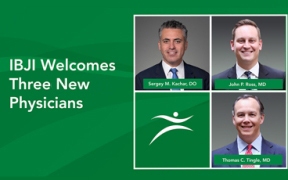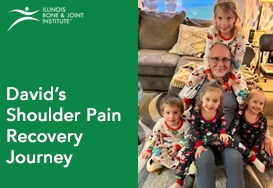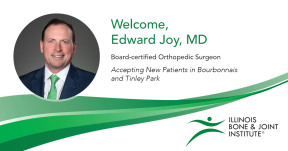Q&A with IBJI Spine Surgeon William Mosenthal, MD

William P. Mosenthal, MD
Orthopedic Surgeon with Fellowship Training in Spine Surgery
Dr. Mosenthal practices at the Bourbonnais, Frankfort, and Mokena Doctors' Offices.
What Is Degenerative Disc Disease?
Dr. Mosenthal: Degenerative disc disease is an extremely broad term that can be generalized as a change in the normal appearance of the disc on MRI. Radiologists who don’t have the ability to know the symptoms of the patients will comment on any changes they see on the MRI. One of the most common changes is in the disc and that’s where the term degenerative disc disease comes from. But it’s not a disease. It’s from the normal aging process. As we get older and develop wrinkles and white hair, we see the same aging in the discs which are not as well hydrated.
What Does Degenerative Disc Disease Look Like on an MRI?
Dr. Mosenthal: A healthy disc is nice and tall and if you think of a disc as a jelly donut, the jelly is the hydrated portion of the disc. It shows up on MRI as a white juicy center. It allows you to absorb shock. As we get older, you can develop a black disc or it becomes flattened out. It isn’t as tall as it was when we were younger.
Is Degenerative Disc Disease the Cause of My Back Pain?
Dr. Mosenthal: We know that discs have little nerve endings on them and in certain cases as the discs wear out, they can be a source of pain and we call that discogenic back pain. That is one condition where the degeneration of the disc can cause back pain. Another can be a disc herniation. As it loses its height it can push some of the contents out. Using the jelly donut analogy, the jelly gets squeezed into the canal and irritates the nerve. Injury can also cause this herniation.
Who Does This Commonly Affect?
Dr. Mosenthal: It’s usually seen in the 30-50-year-old group.
Which Discs Can Be Affected?
Dr. Mosenthal: All discs can be affected, but if we are talking about back pain, most of the disc problems tend to show up in the L4-L5 and L5-S1 (lumbosacral joint).
What Are Some of the Symptoms?
Dr. Mosenthal: Within degenerative disc disease, we see discogenic pain and radiculopathy pain. Discogenic is low back pain without leg pain, and it’s pain that is worse with sitting and better with frequent positional changes and walking. Patients will say they can’t find a comfortable position in their chair. They’re having to shift or stand up for a few minutes.
Radiculopathy (sciatica) is back pain and leg pain. It’s pain that radiates down to your thigh, past your knee, and there can be numbness and tingling.
How Is It Diagnosed?
Dr. Mosenthal: Because MRIs are so sensitive and pick up on the smallest changes, it can be hard to differentiate what is normal aging and what is actually causing the pain. If we MRI 100 people without back pain, 64 of them will have some abnormality within their discs. It’s quite common to have abnormal MRIs in normal healthy people. We have to go by the pain that the patients are telling us and perform a physical examination.
How Does It Affect Daily Life?
Dr. Mosenthal: It depends where a patient is in the spectrum of the disease. Some can have very debilitating symptoms and some can be asymptomatic. People with discogenic or disc herniations typically have problems sitting for extended periods of time which makes desk jobs or manual labor that requires bending, lifting, or twisting difficult. Those three motions put a lot of stress on the back. For a construction worker, for example, that would be challenging.
What Happens to the Spine During Disc Degeneration?
Dr. Mosenthal: If you get severe loss of disc height, then it can change the biomechanics on the levels above and below. That’s for advanced cases. But for the 30-year-old patient with a small disc herniation, there’s enough disc remaining that it’s probably not going to affect the other levels too bad.
How Common Is Disc Degeneration?
Dr. Mosenthal: Back pain due to problems with the discs is extremely common. We know that the lifetime prevalence of low back pain is about 80 percent. And problems with the disc are responsible for a large number of back pain problems.
Can Disc Herniation Go Away on Its Own?
Dr. Mosenthal: A total of 90 percent of people with disc herniations can get their symptoms under control without surgery. That’s one of the first things I tell patients. We reassure them. They can get better without surgery. While the disc height might not go back to the way it was before, the body can reabsorb the disc herniation thereby reducing the pain.
What Are Some Non-invasive Treatments?
Dr. Mosenthal: The first-line treatment is activity modifications. Patients should avoid extended periods of sitting, twisting, bending, or heavy lifting. Start physical therapy exercises both for strengthening and stretching, which will depend on what phase they’re in. In the acute phase, they would want to reduce the pain with light stretching and finding positions of comfort. Usually lying on your stomach is one of the most comfortable positions for people with disc problems. It helps to take the pressure off of the discs. Then they can transition to strengthening exercises as a way to prevent a recurrence.
How Long Does Physical Therapy Last?
Dr. Mosenthal: Physical therapy can vary, depending on how comfortable the patient is with the exercises. Most people aim for eight weeks, but there is a large home exercise component both during and after the formal in-person physical therapy.
What Can Patients Do at Home to Alleviate Pain?
Dr. Mosenthal: Finding the position that allows you to be in less pain is probably a good position to be in. Lying on the stomach tends to be one of the most comfortable positions. Get into any position that centralizes your pain. If you have sciatica pain going down past your knee and you find that a specific chair or position causes that pain to travel up your thigh or into your back, that’s called centralizing pain, or bringing it back to the point of origin, the origin being the back.
What Medications Are Recommended for Degenerative Disc Disease Treatment?
Dr. Mosenthal: Non-steroid anti-inflammatory drugs (NSAIDs) - medications like ibuprofen, naproxen, acetaminophen, and the next step up would be possibly prednisone. You can supplement with ice and heat. People also ask, “Which one should I use, ice or heat?” I tell people that there is no definitive evidence to support one or the other so I recommend you try both and do whatever works best for you.
Who Should Opt for Surgery for Degenerative Disc Disease?
Dr. Mosenthal: A lot of people with sciatica pain are suffering from a pinched nerve from disc herniation and the vast majority are able to get better without surgery. There is a small number of people who do not do well. If you’ve tried injections, physical therapy, medication, and nothing has worked and it is adversely impacting your quality of life and ability to perform your activities of daily living, then surgery is probably an option because you’re not responding to nonsurgical treatment.
If you have cauda equina syndrome, and that’s a syndrome characterized by loss of bowel and bladder control and genital numbness which can be caused by a very large disc herniation, that’s a surgical emergency. If the weakness is severe or progressive, then that would be an indication for surgery.
Can You Describe Surgery for Disc Herniation Causing Sciatica?
Dr. Mosenthal: The surgery is called a laminotomy discectomy and it’s also called a decompression surgery. The laminotomy is making a small window in the bone that’s protecting the spinal canal. That gives the surgeon access to the pinched nerve and the disc and the microdiscectomy refers to only taking out some of the discs. We only remove the portion that is touching the nerve.
When Should a Patient See an Orthopedist?
Dr. Mosenthal: Reasons to seek emergent care in the emergency department would be loss of bowel or bladder control, genital numbness, or progressive weakness.
For patients who have pain or numbness that travels down into the buttocks or leg typically because of a disc herniation, it would be worth it for them to see an orthopedist.
Finally, if you have back pain that is impacting your quality of life, not just the occasional backache, but it’s making it difficult for you to do what you need to do during the day, you don't lose anything by talking to someone who specializes in the spine.
The fact that you see a spine surgeon doesn’t mean you’re going to be told you need spine surgery. The vast majority of people that spine surgeons see don’t have a problem that requires surgery. A lot of what we do is to diagnose the pain generator which allows for more personalized treatment. Patients want to know why their back hurts and they want to know how to get better.
Schedule online with an IBJI Physician
Need to see a doctor for spine treatment? schedule online today with one of IBJI’s spine doctors—online or in-person—to learn more treatment options to get you back to feeling your best.




